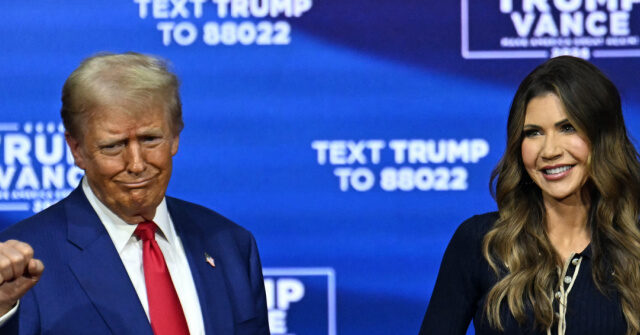President-elect Donald Trump recently nominated South Dakota Governor Kristi Noem as his Secretary of the Department of Homeland Security (DHS). This decision comes as part of Trump’s efforts to solidify his administration’s focus on border security and immigration policy. In his announcement, Trump praised Noem’s robust approach to border issues, particularly her actions in sending National Guard troops to assist Texas during what he termed the “Biden Border Crisis.” He emphasized her commitment to collaborating with notable figures in border enforcement, such as Tom Homan, who he referred to as the ‘Border Czar.’ Trump expressed confidence in Noem’s capabilities, stating that she would be instrumental in his mission to enhance national safety.
Accepting the nomination, Noem expressed her gratitude and determination to fulfill the responsibilities of the DHS. She echoed Trump’s sentiment regarding the need to secure the border and restore safety in American communities, reinforcing the idea that these measures are essential for families to pursue the American Dream. Her nomination reflects broader themes in Trump’s cabinet choices, which tend to favor individuals with a strong stance on immigration and border security. The Senate will now review and confirm her nomination, marking a significant step in Trump’s administration plans for enhancing homeland security.
Noem’s selection has been well-received by certain factions within the Republican party and aligns with Trump’s strategy of surrounding himself with aides and advisors focused on pro-American immigration policies. Reports indicate that her nomination complements Trump’s hiring of known immigration hardliners such as Stephen Miller and Homan, who are expected to enforce strict immigration policies against resistance from entrenched civil servants in various government departments. This focus suggests Trump aims to create a streamlined approach to immigration that prioritizes American interests, differing from previous administrations’ practices.
Despite this assertive approach to immigration, some observations have indicated that Noem has not been deeply involved in immigration policy during her tenure as governor. While she has expressed concerns primarily related to H-2B visa worker availability for agriculture, her broader expertise in national immigration policy remains to be seen. Critics may question her qualifications for such an important role, as the Department of Homeland Security encompasses a wide array of responsibilities beyond just border control, including disaster response and cybersecurity.
Trump’s administration has historically faced challenges in effectively implementing its immigration reforms, often encountering resistance from established bureaucracies. The appointment of Noem and similar figures could be part of a long-term strategy to circumvent these obstacles by placing loyal proponents of Trump’s agenda in key positions, thereby ensuring alignment with the administration’s objectives. The potential implications of her nomination also highlight the ongoing ideological battle within immigration discourse in the United States, where issues surrounding security, legality, and humanitarian considerations are constantly debated.
As the nomination process continues, the scrutiny Noem faces will likely delve into her track record as a governor and her plans to handle the myriad challenges that come with the Secretary of Homeland Security position. There is a palpable interest in how she will navigate the complexities of immigration policy, national security, and inter-agency cooperation. Trump’s confidence in Noem signals a commitment to his agenda of strong national defense and immigration enforcement, promising to reshape the DHS under her leadership while prompting discussions around the future of American immigration policies.

